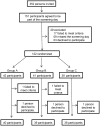Effects of Brazilian Cardioprotective Diet Program on risk factors in patients with coronary heart disease: a Brazilian Cardioprotective Diet randomized pilot trial
- PMID: 23295594
- PMCID: PMC3521803
- DOI: 10.6061/clinics/2012(12)10
Effects of Brazilian Cardioprotective Diet Program on risk factors in patients with coronary heart disease: a Brazilian Cardioprotective Diet randomized pilot trial
Abstract
Objective: To evaluate the effectiveness of the Brazilian Cardioprotective Diet Program in reducing blood pressures, fasting glucose levels and body mass indices in patients with established atherothrombotic disease.
Method: This randomized controlled pilot trial included outpatients who were over 45 years of age with atherothrombotic cardiovascular disease. Group A, who received the Brazilian Cardioprotective Diet Program, had weekly sessions with dietitians. Groups B and C received the usual dietary therapy that is given to patients with cardiovascular diseases as proposed by the Brazilian guidelines. This diet had the same nutrient profile as that given to Group A, but it was customized by the integration of typical Mediterranean foods. The difference between Groups B and C was the number of sessions with the dietitian. Group B received weekly sessions, while group C only had monthly sessions. ClinicalTrials.gov: NCT 01453166.
Results: There was a greater reduction in systolic (7.8%) and diastolic (10.8%) blood pressures in Group A compared with Group B (2.3% and 7.3%), and Group C (3.9% and 4.9%, respectively). Fasting glucose decreased by 5.3% and 2% in Groups A and B, respectively. Fasting glucose increased by 3.7% in Group C. The BMIs decreased by 3.5% and 3.3% in Groups A and B, respectively. Group C did not present with any changes in BMI. However, none of these data showed statistical differences between the groups, which is methodologically acceptable in pilot trials.
Conclusions: The Brazilian Cardioprotective Diet Program seems to be more effective in reducing blood pressures, fasting glucose levels, weights and BMIs in patients with previous cardiovascular disease compared with the diet that has been proposed by the Brazilian guidelines.
Trial registration: ClinicalTrials.gov NCT01453166.
Conflict of interest statement
No potential conflict of interest was reported.
Figures
Comment in
-
It is important to control for confounders when examining the role of diet in cardiovascular disease prevention.Clinics (Sao Paulo). 2013 Apr;68(4):575. doi: 10.6061/clinics/2013(04)22. Clinics (Sao Paulo). 2013. PMID: 23778352 Free PMC article. No abstract available.
References
-
- World Health Organization. Mortality estimates by cause, age, and sex for the year 2008. 2011. Geneva: WHO
-
- Hooper L, Griffiths E, Abrahams B, Alexander W, Atkins S, Atkinson G, et al. Dietetic guidelines: diet in secondary prevention of cardiovascular disease (first update, June 2003) J Hum Nutr Diet. 2004;17(4):337–49. - PubMed
-
- Appel LJ, Sacks FM, Carey VJ, Obarzanek E, Swain JF, Miller ER, III, et al. Effects of protein, monounsaturated fat, and carbohydrate intake on blood pressure and serum lipids: results of the Omni Heart randomized trial. JAMA. 2005;294(19):2455–64. - PubMed
-
- Parikh P, McDaniel MC, Ashen MD, Miller JI, Sorrentino M, Chan V, et al. Diets and cardiovascular disease: an evidence-based assessment. J Am Coll Cardiol. 2005;45:1379–87. - PubMed
-
- Willett WC, Sacks F, Trichopoulou A, Drescher G, Ferro-Luzzi A, Helsing E, et al. Mediterranean diet pyramid: a cultural model for healthy eating. Am J Clin Nutr. 1995;61(6 Suppl) :1402S–6S. - PubMed
Publication types
MeSH terms
Substances
Associated data
LinkOut - more resources
Full Text Sources
Medical



